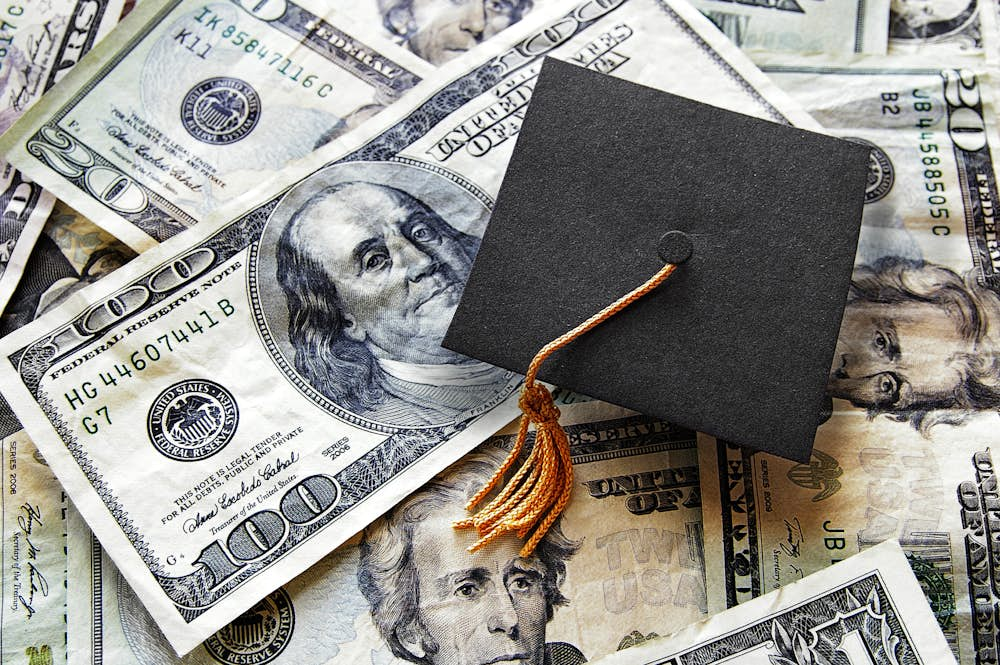(770) 344-0172
(770) 344-0172
Oct 16, 2023

Student loan payments are resuming after a long hiatus. Currently, Americans owe $1.77 Trillion in student loan debt, up roughly $100 Billion when compared to pre-pandemic times. Efforts made by the Biden administration to forgive an estimated $430 billion have halted and there is no timetable for a forgiveness program currently. So, borrowers have no choice but to begin paying down their student loan debt. Today at Narwhal we want to provide some tips on how to pay down student loan debt by addressing a few frequently asked questions.
A good reminder is that if you are in school (at least part-time), you are not currently required to begin paying off your student loans, although you can if you want. If you have graduated recently and are still in your grace period (average 6 months), you are not required to pay off student debt until that grace period ends as well.
Should I Max Out My Student Loan Payments or Make The Minimum Payment?
This question doesn’t necessarily have a correct answer. To some, debt may seem bad and as a result, a central financial focus for some borrowers is to pay down their debt. Whether this may be due to their upbringing with their parents prioritizing low debt or just being tight on money growing up, many borrowers try to avoid the same financial positions that hurt their parents growing up.
The question really comes down to your circumstances. Borrowers should make efforts to have a sufficient emergency fund before they try to make more than the minimum payment in my opinion. At Narwhal, we believe it is important to prioritize building an emergency fund before aggressively paying down student loans. Borrowers must also understand their goals. Are you getting married soon? Is there a baby on the way? Are you buying a home? All of these questions may impact your decision on how to pay off student loan debt as they should. The name of the game essentially boils down to free cash flow which is best thought of as how much money is left over after all expenses are covered. If the free cash flow number is a number that borrowers feel will not cause financial hardship, then making additional payments on top of the minimum required student loan payment is not necessarily the wrong choice. It all comes down to everyone’s individual situation.
What Is The Difference Between Refinancing And Consolidation?
When you consolidate your federal student loans, you combine your existing loans into one new loan with a new rate, which is a weighted average of your old loan’s rates. Consolidation essentially creates a simpler situation for the borrower as they make payments toward their loan as they are all combined into one loan and thus require one payment.
With private loan consolidation, you combine multiple loans into one, but your interest rate on your new loan is not a weighted average of your old loans rates. The private lender will assess a rate that is based on your credit management and other personal financial information. When you consolidate student loans with a private lender, you are also refinancing those loans.
Student loan refinancing is when a new loan from a private lender is used to pay off one or more existing loans. Doing this could allow a borrower to have lower payments and reduce the amount spent in interest over the life of the loan.
Should I Refinance My Student Loan Debt?
The answer to this question may have been simpler before the Federal Reserve started its rate hike process in early 2022. As interest rates have risen exponentially, the cost of refinancing has risen as well. Refinancing your student loan debt may result in a higher interest rate with the current macroeconomic backdrop. To simplify, rates have been rising, so in all likelihood it would not be beneficial to surrender a lower interest rate to take on a higher one. That said, if rates fall and more attractive rates become available, it may be worth considering refinancing.
Some student loan borrowers have considered consolidating their student loans into their home loan via a cash-out refinance. Although this may reduce their total monthly student loan payment as it can be amortized over a 30-year mortgage, with home loan interest rates rising as well, this may not be the wisest of choices. Sacrificing a lower interest rate on a mortgage to consolidate student loan debt may not ultimately be the wisest choice.
Are There Any Student Loan Payment Options Designed to Provide Borrower Relief?
The different payment options vary by the who the lender is. The government offers a few different repayment plans designed to help borrowers. The standard plan is a loan that is designed to be paid off in 10 years once a borrower is set to begin their payments from the date of the first payment. The first alternative repayment plan is the “Graduated Repayment Plan”. This plan is designed to have lower payments at the beginning with a gradual increase in payment amount usually every two years and ensure that your loan will be paid off in the same time frame as a standard repayment plan. Payments on the back end of this loan option will be higher than payments at the beginning but help borrowers with relief in the short-term. This plan is optimized to help borrowers early in their career as they are theoretically going to make less in the beginning and earn more as their career progresses. The downside to this option, and this will be the case with most alternative repayment plans, is that the borrower will end up paying more over the entirety of the loan.
Another common repayment plan alternative is the “Income-Based Repayment Plan”. The “IBR” is calculated by the government, although they do provide some guidance. The IBR repayment plan is designed so that borrowers pay 10%-15% of their discretionary income to student loans. It is worth noting that under the IBR repayment plan, borrowers will never pay more than the 10-year Standard Repayment Plan. A similar plan to the IBR is the “SAVE Plan”. This plan is designed so that borrowers use as low as 5% of their discretionary income towards student loan repayments over a an extended period according to the White House. Other alternative repayment plan options are available from the government and the link given will help readers browse through other options. Private student loans vary by the lender although many will offer interest only payment plans for certain periods of time, often 1 year.
In some instances, borrowers can seek relief through their employers as many firms offer help with paying down student debt. It is recommended that borrowers check with their employee benefits program with their respective employers.
To summarize, student loan repayments are sure to bring financial headaches to borrowers across the country. There are multiple ways to help ease the burden of resuming student loan payments. We at Narwhal are always willing to help explain further and if you have any additional questions feel free to reach out.

Account Executive
Moe started at Narwhal in the fall of 2022 as an investment intern and joined the Narwhal team in a full-time role in April of 2023 after graduating from the University of Georgia with a degree in Finance and an emphasis in Pricing and Valuation. Moe is tasked with servicing a portion of Narwhal’s client base and evaluating and doing research on investments as a member of the Investment Committee. In his free time, Moe enjoys going to Braves’ games, playing golf, hiking, and watching the Georgia Bulldogs win National Championships.
At Narwhal Capital Management, you’re more than just a portfolio, and it’s not all about the numbers. Let’s start with a meeting about your needs and future goals.